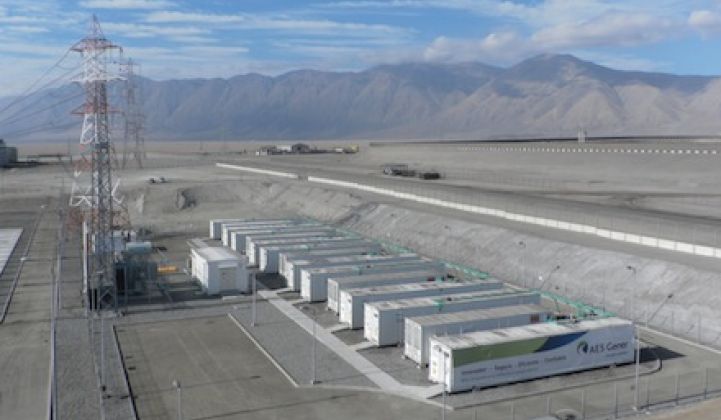A groundbreaking agreement between Arizona Public Service (APS) and Arizona's ratepayer advocate could create a surge of new storage deployment in the state over the next seven years.
Late last week, APS and the Residential Utility Consumer Office (RUCO) jointly filed a settlement that, if approved, would require APS to evaluate storage, efficiency, renewables and demand response as a potential alternative to building or upgrading conventional power plants between 2015 and 2021.
The settlement would also ensure that APS considers storage as a companion or a replacement for natural gas peaking plants over the same time period.
"If a new simple-cycle combustion turbine is proposed to be in service before 2021...at least 10% of the capacity shall be competitively procured energy storage as long as it meets the cost effectiveness and reliability criteria of the proposed simple-cycle combustion turbine," reads the settlement, filed last Friday afternoon.
In addition to considering alternatives to conventional peaking units, APS would seek competitive bids for storage projects worth 10 megawatt-hours by the end of 2018. An independent monitor would examine the bids for both peaking resources and conventional generation in order to make recommendations on the most cost effective solutions for ratepayers.
“This is an open door for the storage industry to play if they are able to match the value and economics of a peaker," said Lon Huber, a special projects advisor at RUCO, who helped write the language.
Huber said that APS could need around 4,000 megawatts of generation through the end of the decade. Assuming project developers and demand response providers can bid competitively against conventional power plants, the state could see a surge of new opportunities in Arizona Public Service's territory.
"This revised procurement method will help ensure that all technologies and configurations of those technologies are on the table to meet that need," he said.
The idea for the alternative procurement was spawned after APS filed an application for environmental review of its Ocotillo peaker plant in Tempe, which it is outfitting with ten new 502-megawatt turbines. The ratepayer advocate intervened in the filing, asking for a process to consider technologies other than natural gas. APS agreed to the proposal and jointly filed the settlement with RUCO.
The utility wrote that it was "consistent with APS resource planning efforts," and fully backed the plan.
"APS recognizes that technical innovation, environmental concerns and shifting public policies have led to the rapid development of new technologies that are reshaping the energy landscape. Additionally, it is important to monitor these technology advancements through applied research and development," reads the document.
Regulators at the Arizona Corporation Commission must review the settlement and will likely vote on it in October.
The plan comes as regulators review a plan by APS to develop 20 megawatts of rooftop solar systems through 2015. The state has also been grappling with whether to change net metering policy. Last November, in a compromise brokered by RUCO, regulators agreed to impose a $0.70 per kilowatt charge on those taking advantage of net metering in order to offset fixed grid costs -- a fee far lower than the $8.00 per kilowatt proposed by APS.
Although the debate over distributed solar is not fully settled in Arizona, this latest compromise opens up many new opportunities for competitive alternatives to conventional fossil fuels. And in this case, APS is fully on board.
“By creating a level playing field between technologies, this policy puts faith in the marketplace to come up with the most cost-effective solutions to meet system needs. This includes DR, existing merchant generators, storage, and renewables," said Huber.



